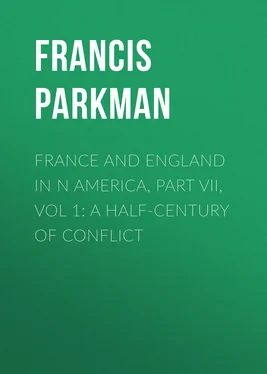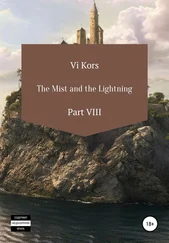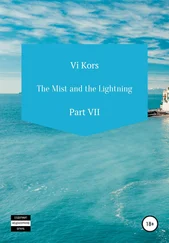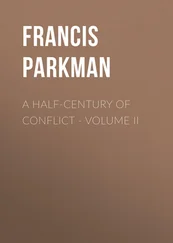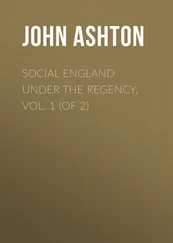Francis Parkman - France and England in N America, Part VII, Vol 1 - A Half-Century of Conflict
Здесь есть возможность читать онлайн «Francis Parkman - France and England in N America, Part VII, Vol 1 - A Half-Century of Conflict» — ознакомительный отрывок электронной книги совершенно бесплатно, а после прочтения отрывка купить полную версию. В некоторых случаях можно слушать аудио, скачать через торрент в формате fb2 и присутствует краткое содержание. Жанр: foreign_prose, История, foreign_edu, foreign_antique, на английском языке. Описание произведения, (предисловие) а так же отзывы посетителей доступны на портале библиотеки ЛибКат.
- Название:France and England in N America, Part VII, Vol 1: A Half-Century of Conflict
- Автор:
- Жанр:
- Год:неизвестен
- ISBN:нет данных
- Рейтинг книги:3 / 5. Голосов: 1
-
Избранное:Добавить в избранное
- Отзывы:
-
Ваша оценка:
- 60
- 1
- 2
- 3
- 4
- 5
France and England in N America, Part VII, Vol 1: A Half-Century of Conflict: краткое содержание, описание и аннотация
Предлагаем к чтению аннотацию, описание, краткое содержание или предисловие (зависит от того, что написал сам автор книги «France and England in N America, Part VII, Vol 1: A Half-Century of Conflict»). Если вы не нашли необходимую информацию о книге — напишите в комментариях, мы постараемся отыскать её.
France and England in N America, Part VII, Vol 1: A Half-Century of Conflict — читать онлайн ознакомительный отрывок
Ниже представлен текст книги, разбитый по страницам. Система сохранения места последней прочитанной страницы, позволяет с удобством читать онлайн бесплатно книгу «France and England in N America, Part VII, Vol 1: A Half-Century of Conflict», без необходимости каждый раз заново искать на чём Вы остановились. Поставьте закладку, и сможете в любой момент перейти на страницу, на которой закончили чтение.
Интервал:
Закладка:
While the New England colonies, and especially Massachusetts and New Hampshire, had most cause to deprecate a war, the prospect of one was also extremely unwelcome to the people of New York. The conflict lately closed had borne hard upon them through the attacks of the enemy, and still more through the derangement of their industries. They were distracted, too, with the factions rising out of the recent revolution under Jacob Leisler. New York had been the bulwark of the colonies farther south, who, feeling themselves safe, had given their protector little help, and that little grudgingly, seeming to regard the war as no concern of theirs. Three thousand and fifty-one pounds, provincial currency, was the joint contribution of Virginia, Maryland, East Jersey, and Connecticut to the aid of New York during five years of the late war. 4 4 Schuyler, Colonial New York , i. 431, 432.
Massachusetts could give nothing, even if she would, her hands being full with the defence of her own borders. Colonel Quary wrote to the Board of Trade that New York could not bear alone the cost of defending herself; that the other colonies were "stuffed with commonwealth notions," and were "of a sour temper in opposition to government," so that Parliament ought to take them in hand and compel each to do its part in the common cause. 5 5 Colonel Quary to the Lords of Trade, 16 June, 1703.
To this Lord Cornbury adds that Rhode Island and Connecticut are even more stubborn than the rest, hate all true subjects of the Queen, and will not give a farthing to the war so long as they can help it. 6 6 Cornbury to the Lords of Trade, 9 September, 1703.
Each province lived in selfish isolation, recking little of its neighbor's woes.
New York, left to fight her own battles, was in a wretched condition for defence. It is true that, unlike the other colonies, the King had sent her a few soldiers, counting at this time about one hundred and eighty, all told; 7 7 Bellomont to the Lords of Trade, 28 February, 1700.
but they had been left so long without pay that they were in a state of scandalous destitution. They would have been left without rations had not three private gentlemen—Schuyler, Livingston, and Cortlandt—advanced money for their supplies, which seems never to have been repaid. 8 8 Ibid.
They are reported to have been "without shirts, breeches, shoes, or stockings," and "in such a shameful condition that the women when passing them are obliged to cover their eyes." "The Indians ask," says the governor, "'Do you think us such fools as to believe that a king who cannot clothe his soldiers can protect us from the French, with their fourteen hundred men all well equipped?'" 9 9 Schuyler, Colonial New York , i. 488.
The forts were no better than their garrisons. The governor complains that those of Albany and Schenectady "are so weak and ridiculous that they look more like pounds for cattle than forts." At Albany the rotten stockades were falling from their own weight.
If New York had cause to complain of those whom she sheltered, she herself gave cause of complaint to those who sheltered her. The Five Nations of the Iroquois had always been her allies against the French, had guarded her borders and fought her battles. What they wanted in return were gifts, attentions, just dealings, and active aid in war; but they got them in scant measure. Their treatment by the province was short-sighted, if not ungrateful. New York was a mixture of races and religions not yet fused into a harmonious body politic, divided in interests and torn with intestine disputes. Its Assembly was made up in large part of men unfitted to pursue a consistent scheme of policy, or spend the little money at their disposal on any objects but those of present and visible interest. The royal governors, even when personally competent, were hampered by want of means and by factious opposition. The Five Nations were robbed by land-speculators, cheated by traders, and feebly supported in their constant wars with the French. Spasmodically, as it were, on occasions of crisis, they were summoned to Albany, soothed with such presents as could be got from unwilling legislators, or now and then from the Crown, and exhorted to fight vigorously in the common cause. The case would have been far worse but for a few patriotic men, with Peter Schuyler at their head, who understood the character of these Indians, and labored strenuously to keep them in what was called their allegiance.
The proud and fierce confederates had suffered greatly in the late war. Their numbers had been reduced about one half, and they now counted little more than twelve hundred warriors. They had learned a bitter and humiliating lesson, and their arrogance had changed to distrust and alarm. Though hating the French, they had learned to respect their military activity and prowess, and to look askance on the Dutch and English, who rarely struck a blow in their defence, and suffered their hereditary enemy to waste their fields and burn their towns. The English called the Five Nations British subjects, on which the French taunted them with being British slaves, and told them that the King of England had ordered the governor of New York to poison them. This invention had great effect. The Iroquois capital, Onondaga, was filled with wild rumors. The credulous savages were tossed among doubts, suspicions, and fears. Some were in terror of poison, and some of witchcraft. They believed that the rival European nations had leagued to destroy them and divide their lands, and that they were bewitched by sorcerers, both French and English. 10 10 N. Y. Col. Docs. , iv. 658.
After the Peace of Ryswick, and even before it, the French governor kept agents among them. Some of these were soldiers, like Joncaire, Maricourt, or Longueuil, and some were Jesuits, like Bruyas, Lamberville, or Vaillant. The Jesuits showed their usual ability and skill in their difficult and perilous task. The Indians derived various advantages from their presence, which they regarded also as a flattering attention; while the English, jealous of their influence, made feeble attempts to counteract it by sending Protestant clergymen to Onondaga. "But," writes Lord Bellomont, "it is next to impossible to prevail with the ministers to live among the Indians. They [the Indians] are so nasty as never to wash their hands, or the utensils they dress their victuals with." 11 11 Bellomont to the Lords of Trade, 17 October, 1700.
Even had their zeal been proof to these afflictions, the ministers would have been no match for their astute opponents. In vain Bellomont assured the Indians that the Jesuits were "the greatest lyars and impostors in the world." 12 12 Conference of Bellomont with the Indians, 26 August, 1700.
In vain he offered a hundred dollars for every one of them whom they should deliver into his hands. They would promise to expel them; but their minds were divided, and they stood in fear of one another. While one party distrusted and disliked the priests, another was begging the governor of Canada to send more. Others took a practical view of the question. "If the English sell goods cheaper than the French, we will have ministers; if the French sell them cheaper than the English, we will have priests." Others, again, wanted neither Jesuits nor ministers, "because both of you [English and French] have made us drunk with the noise of your praying." 13 13 Journal of Bleeker and Schuyler on their visit to Onondaga, August, September, 1701.
The aims of the propagandists on both sides were secular. The French wished to keep the Five Nations neutral in the event of another war; the English wished to spur them to active hostility; but while the former pursued their purpose with energy and skill, the efforts of the latter were intermittent and generally feeble.
Читать дальшеИнтервал:
Закладка:
Похожие книги на «France and England in N America, Part VII, Vol 1: A Half-Century of Conflict»
Представляем Вашему вниманию похожие книги на «France and England in N America, Part VII, Vol 1: A Half-Century of Conflict» списком для выбора. Мы отобрали схожую по названию и смыслу литературу в надежде предоставить читателям больше вариантов отыскать новые, интересные, ещё непрочитанные произведения.
Обсуждение, отзывы о книге «France and England in N America, Part VII, Vol 1: A Half-Century of Conflict» и просто собственные мнения читателей. Оставьте ваши комментарии, напишите, что Вы думаете о произведении, его смысле или главных героях. Укажите что конкретно понравилось, а что нет, и почему Вы так считаете.
